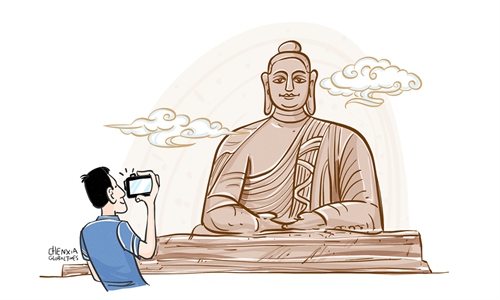ARTS / CULTURE & LEISURE
Rise of Chinese humor in English bridges gaps in cultural exchanges

A screenshot of the game Black Myth: Wukong showing Black Bear Guai Photo: Courtesy of Game Science
Chinese humor in English has become a powerful tool for fostering global understanding through cultural products. Social media is buzzing with examples where this unique blend of English, infused with Chinese cultural nuances, not only entertains netizens, but also bridges gaps in cross-cultural communication.A viral example of Chinese humor in English evolving appeal surfaced when a foreign blogger YourKris shared an emotional post on Chinese social media platform Xiaohongshu about seeing off her boyfriend at the airport.
Her comments quickly were filled with well-meaning but imperfectly translated messages from Chinese netizens, turning phrases like "You pretty, he ugly, u swan, he frog" into a source of both consolation and amusement.
This exchange highlighted how Chinese-style English, referred to as Chinglish, once seen as an embarrassing mishmash, has become a unique cultural bridge, resonating with humor and warmth across languages and borders.
Originally, Chinglish was often viewed as mistakes to be corrected or even ridiculed, especially in formal English education in China, where accuracy and native-like pronunciation were emphasized.
However, after the Beijing 2008 Olympics, when English speakers expressed a relaxed attitude toward Chinglish signs in China, this linguistic blend gained recognition, not just as a source of humor, but as a reflection of the cultural exchange and globalization that characterizes modern China.
The shift in perception is reflected in the gaming community, particularly in the recent hit video game Black Myth: Wukong, where terms from Chinese mythology, such as yaoguai, are no longer translated as "monster," but kept in their original form.
Chinese netizens have started explaining key game terms to foreign players to help them better understand the cultural background of the game. This effort fosters a deeper appreciation for the cultural richness of China.
A writing professor in the US told the Global Times on condition of anonymity that Chinglish is increasingly used by teenagers as a tool for better communication, citing phrases like "Long time no see."
He emphasized that language, as a form of communication, can evolve with cultural exchanges, making it acceptable to use Chinglish phrases in everyday conversation to achieve better understanding.
The story of German scholar Oliver Radtke also illustrates this shift. His curiosity about Chinese society led him to document the various Chinglish signs he encountered during his travels in 2019.
Initially, Oliver's project was met with criticism from some Chinese netizens who perceived it as mocking.
However, as he clarified his intentions - to highlight the charm and creativity within Chinglish - more people began to appreciate the unique cultural interplay these translations represent, according to the Chinese Consulate-General in Frankfurt.
Chinglish has not only captured the interest of individuals like Oliver, but has also entered broader cultural conversations.
The stage play Chinglish, written by David Henry Hwang in 2011, set in Guiyang, capital of Southwest China's Guizhou Province, explores the complexities and humor of cross-cultural communication.
The play underscores how Chinglish can create both challenges and opportunities for understanding in an increasingly interconnected world.
Moreover, the incorporation of Chinglish into mainstream language resources, such as the Oxford English Dictionary, further solidifies its status as a recognized linguistic form.
Phrases like "add oil" - a cheer meaning "go for it" are now officially recorded in the dictionary, demonstrating how Chinglish captures uniquely Chinese expressions that resonate globally.
These entries, often related to Chinese culture and food, highlight the growing influence of Chinglish as a distinct variant of English.
However, the US professor also expressed concern over the potential misuse of Chinglish, emphasizing that while it can be effective in oral communication, it remains unsuitable for formal and academic settings. Learning and using standard English remains important in public and professional contexts.
The spread of Chinglish reflects a broader acceptance of linguistic diversity and the idea that language evolves with cultural exchange.
The playful mix of languages has become a way for people worldwide to engage with Chinese culture, often leading to moments of cross-cultural understanding and amusement.
The author is a reporter with the Global Times. life@globaltimes.com.cn



